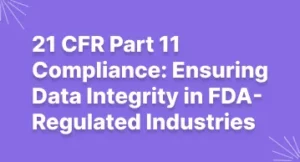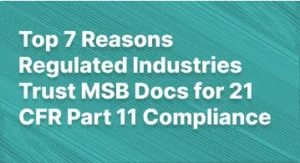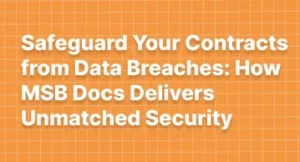Achieving Business Compliance: A Deep Dive into KYC Practices
Introduction
In today’s global business landscape, where transactions cross borders and industries seamlessly, the need for robust compliance measures has never been more critical. One such essential compliance process is ‘Know Your Customer’ or ‘KYC.’ This practice is vital for businesses across various sectors to ensure transparency, security, and regulatory compliance. In this comprehensive blog post, we will delve into the world of KYC compliance, discussing its importance, different types, global regulations, requirements for customer onboarding, and the need for automated KYC solutions. We’ll also highlight the role of MSB Docs’ eKYC solution in helping businesses ensure KYC compliance effectively.
Understanding KYC
What is ‘Know Your Customer’ or ‘KYC’?
KYC, short for ‘Know Your Customer,’ is a regulatory framework designed to verify and authenticate the identity of customers or clients. The primary objective of KYC is to prevent fraudulent activities, money laundering, and other financial crimes by ensuring that businesses have accurate information about their customers.
Different Types of KYC Compliance
- Customer Due Diligence (CDD): CDD involves gathering information about the customer’s identity and assessing their risk profile. It helps businesses understand who their customers are and whether they pose a risk.
- Enhanced Due Diligence (EDD): EDD is applied when dealing with high-risk customers, such as politically exposed persons (PEPs) or businesses in high-risk jurisdictions. It involves a more thorough investigation of the customer’s background and transactions.
- Simplified Due Diligence (SDD): SDD is employed for low-risk customers or specific transactions. It involves reduced verification requirements due to the lower risk associated with these customers or activities.
- Ongoing Monitoring: KYC compliance is not a one-time process. Businesses are required to continuously monitor customer transactions and update their information as necessary to detect any suspicious activity.
KYC Regulations Around the World
- USA – Bank Secrecy Act (BSA) and USA PATRIOT Act: These regulations require financial institutions to establish and maintain KYC programs to detect and prevent money laundering and terrorist financing.
- European Union – Anti-Money Laundering Directive (AMLD): AMLD mandates KYC procedures for financial institutions and other designated entities to ensure transparency and prevent money laundering.
- India – Prevention of Money Laundering Act (PMLA): India has strict KYC regulations in place to prevent money laundering and illicit financial activities.
- FATF (Financial Action Task Force): An international organization, FATF sets global standards for KYC and AML practices to combat money laundering and terrorist financing.
- GDPR (General Data Protection Regulation): In Europe, businesses must also adhere to GDPR while conducting KYC to protect customer data and privacy.
Why Are KYC Checks Essential For Businesses?
- Risk Mitigation: KYC helps businesses assess the risk associated with each customer, allowing them to tailor their services accordingly and mitigate potential financial, legal, and reputational risks.
- Regulatory Compliance: Complying with KYC regulations is not optional; it is a legal requirement. Non-compliance can result in hefty fines, legal actions, and damage to a company’s reputation.
- Fraud Prevention: By verifying the identity of customers, businesses can prevent fraudulent activities, including identity theft and financial fraud.
- Trust and Reputation: Implementing robust KYC measures instills trust in customers and partners, enhancing a business’s reputation as a trustworthy and responsible entity.
- Financial Stability: KYC helps in maintaining the stability of the financial system by preventing illicit funds from entering the economy.
KYC Requirements for Customer Onboarding
- Identity Verification: Businesses must verify the customer’s identity using government-issued documents like passports, driver’s licenses, or national IDs.
- Address Verification: Confirming the customer’s residential address is essential, usually by requesting utility bills or other official documents.
- Risk Assessment: Determine the customer’s risk profile based on factors such as their business type, location, and transaction history.
- Ongoing Monitoring: Continuously monitor customer transactions for any suspicious activity or changes in risk.
- Record Keeping: Maintain records of KYC documentation and customer information for regulatory audits.
Do Businesses Need an Automated KYC Solution?
In today’s fast-paced business environment, manual KYC processes are often slow, error-prone, and costly. Therefore, many businesses are turning to automated KYC solutions to streamline compliance efforts. Here’s why automated KYC is crucial:
- Speed and Efficiency: Automated KYC processes can verify customer identities and assess risks in real-time or within minutes, reducing onboarding times and improving the customer experience.
- Accuracy: Automation reduces the risk of human error, ensuring that KYC checks are consistently accurate and compliant with regulations.
- Scalability: Automated KYC solutions can handle a high volume of customer data, making them suitable for businesses of all sizes.
- Regulatory Updates: Automated systems can adapt quickly to changing KYC regulations, ensuring ongoing compliance.
- Cost Savings: By reducing the need for manual labor, businesses can save on operational costs associated with KYC compliance.
Ensure KYC Compliance with MSB Docs’ eKYC Solution
MSB Docs offers a cutting-edge eKYC solution that combines advanced technology with compliance expertise to help businesses meet their KYC requirements effectively. Here are some key features of MSB Docs’ eKYC solution:
- Document Verification: MSB Docs’ eKYC solution can verify documents from multiple countries, ensuring global compliance.
- Regulatory Compliance: The system is updated regularly to stay in line with evolving KYC regulations worldwide.
- Customizable Workflows: Businesses can tailor the eKYC solution to their specific needs and requirements.
- Data Security: MSB Docs prioritizes data security, ensuring that customer information is protected throughout the verification process.
- Real-time Monitoring: The solution offers real-time monitoring of customer transactions for ongoing compliance.
For a comprehensive understanding of KYC practices and their application in different sectors, you may find our blog ‘Top 5 High-Demand Sectors for Digital Stamp Solutions’ insightful.
Conclusion
In conclusion, the importance of KYC compliance cannot be overstated. It is a cornerstone of responsible and secure business operations, and it should be prioritized by organizations of all sizes and industries. By embracing KYC best practices and leveraging advanced eKYC solutions, businesses can thrive in a compliant, secure, and trustworthy environment.
Taken a deep dive into ‘Achieving Business Compliance: A Deep Dive into KYC Practices’? Ready to transform your compliance strategy? Take the next step with MSB Docs. Request a demo or book your free trial today.
FAQs
1. What are the penalties for non-compliance with KYC regulations?
Non-compliance with KYC regulations can result in significant fines and legal repercussions, varying by jurisdiction. Penalties may also include reputational damage, loss of customers, and regulatory sanctions.
2. Can automated KYC solutions adapt to changing regulations?
Yes, automated KYC solutions are designed to adapt to evolving regulations. They often include updates and monitoring features to ensure ongoing compliance with the latest requirements.
3. Is KYC compliance necessary for all types of businesses?
KYC compliance is essential for most businesses, especially those dealing with financial transactions, but the extent of compliance requirements can vary based on the industry, customer risk profiles, and local regulations.
4. How can businesses balance KYC compliance with customer onboarding speed?
Businesses can strike a balance by using automated KYC solutions, which offer quick identity verification while ensuring compliance. Customizable workflows can be designed to match the level of scrutiny to the risk level.
5. Are there international standards for KYC compliance?
Yes, international organizations like the Financial Action Task Force (FATF) set global standards for KYC compliance. Many countries align their regulations with these standards to ensure consistency in combating money laundering and terrorist financing.





